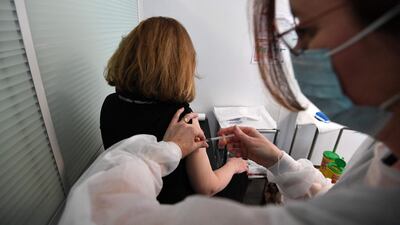Pfizer and BioNTech are testing the effects on people of having a third dose of its Covid-19 vaccine to see if it helps to combat coronavirus mutations.
They believe the two-dose inoculation will work well against two variants – the ones first found in England and South Africa – but they can use those mutations to look for weaknesses in the drug.
The development comes as new research published by Imperial College London on Thursday suggested people who have had two doses of the Pfizer/BioNTech vaccine produce high numbers of antibodies.
Johnson & Johnson’s one-shot coronavirus vaccine is safe and effective, the US Food and Drug Administration said on Wednesday, with an effectiveness against variants of between 57 per cent and 72 per cent.
Pfizer-BioNTech’s planned study into a third dose will allow them to prepare for when more protection is necessary.
"The rate of mutations in the current virus is higher than expected," Pfizer’s chief scientific officer Mikael Dolsten said.
"It's a reasonable probability that we would end up with regular boosts. And for potent vaccines, it may be that you need to do a strain change every few years, but not necessarily every year."
In the first stage of the study, a third 30-microgram dose will be given to fewer than 150 people who received the vaccine six to 12 months ago in the original Phase 1 safety trial.
The trial seeks to measure the antibody response and study whether blood from recipients can neutralise the new coronavirus variants, as well as the safety of a third dose.
"We think our vaccine is robustly active against all strains," Dr Dolsten said. Companies "want to be prepared for all options and be data driven – led by science", he said
The South African and English variants led to tightened lockdown orders as countries tried to slow their spread.
In the ICL/Ipsos Mori study, more than 154,000 participants tested themselves at home using a finger-prick test, showing 13.9 per cent of the population had antibodies, either from infection or vaccination.
More than 17,000 of the participants had received at least one Covid-19 vaccine dose.
"Overall there's very high effectiveness in terms of antibody positivity from two doses of the BioNTech, and also from a single dose in people who have had prior infection," said Prof Paul Elliott of Imperial.
Almost 80 per cent of people aged over 80 tested positive for antibodies after two doses of the Pfizer-BioNTech vaccine.
That rose to 95.5 per cent for those under the age of 60 and 100 per cent in those under 30.
See how vaccination is rolling out in Europe










